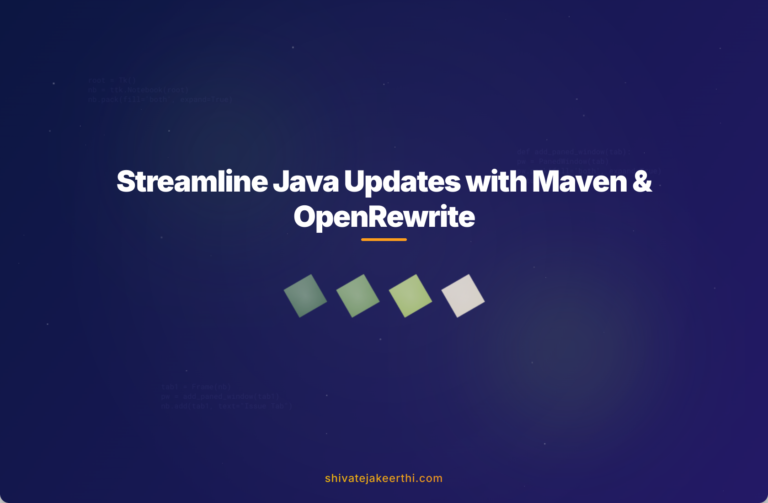Migrating dependencies in legacy Java projects can feel a bit like renovating an old house—necessary, beneficial, but often challenging. Over time, accumulated technical debt, outdated libraries, and security risks highlight the importance of routine dependency maintenance. To efficiently handle this task, tools like OpenRewrite offer the automation and support developers need to simplify these migrations without endless manual adjustments.
Understanding OpenRewrite and the Role of Dependency Migration
OpenRewrite is an open-source tool that helps modernize and refactor Java codebases automatically. Think of it as an expert contractor who assesses your software’s state and systematically renovates the outdated elements to match modern standards. Developed initially by Netflix, OpenRewrite leverages code transformations—or “recipes”—which execute precise, repeatable changes across large codebases effortlessly.
Dependency migrations play a crucial role in keeping software secure, performant, and maintainable. Staying updated reduces security vulnerabilities and ensures compatibility with community standards. Without an efficient migration strategy, projects quickly stagnate, becoming increasingly expensive and cumbersome to maintain.
Exploring Maven Tools for Simplifying Dependency Migration
On many Java projects, Maven remains the cornerstone for managing project dependencies. Maven plugins, such as the Versions Maven Plugin, help streamline dependency updates. This plugin easily identifies outdated components by displaying available newer versions, enabling quicker decisions towards software upgrading.
To use the Versions Maven Plugin, run the following command in your project’s directory:
mvn versions:display-dependency-updates
This simple command provides a clear overview of all your project’s dependencies that potentially need an upgrade, setting the stage for automated migration.
Automatically Discovering the Right OpenRewrite Recipes
Even after identifying outdated dependencies, the next challenge is discovering which OpenRewrite recipes fit your specific dependency migration needs. Manually searching for suitable recipes on OpenRewrite’s platform or documentation can consume significant development time.
Automation provides a practical solution here. One effective pattern involves using the Versions Maven Plugin’s output to discover suitable OpenRewrite recipes. By integrating the data generated from Maven plugins, developers can programmatically identify corresponding refactoring recipes available on OpenRewrite’s platform.
This combined approach significantly reduces guesswork and manual searching, streamlining the overall migration strategy. Integrations ensure that your dependency migrations align precisely with your project’s versions and frameworks, producing accurate and stable results.
Implementing OpenRewrite Recipes for a Smooth Migration
Using OpenRewrite recipes in practice is straightforward once you’ve identified the correct processes. Simply add the relevant OpenRewrite Maven plugin configuration to your project’s pom.xml file:
<plugin>
<groupId>org.openrewrite.maven</groupId>
<artifactId>rewrite-maven-plugin</artifactId>
<version>5.8.0</version>
<configuration>
<activeRecipes>
<recipe>org.openrewrite.java.spring.boot2.UpgradeSpringBoot2</recipe>
</activeRecipes>
</configuration>
</plugin>
To execute these recipes, simply run:
mvn rewrite:run
This command applies your chosen recipes directly to your codebase, automating large-scale changes reliably across hundreds—or even thousands—of files seamlessly.
Tips and Best Practices for Successful Dependency Migration
Before moving forward with dependency migrations, always consider:
- Compatibility Checks: Ensure new dependencies’ integration doesn’t inadvertently break existing functionality or introduce unexpected behaviors.
- Testing Strategies: Comprehensive testing (unit, integration tests, automation tests) helps identify potential issues resulting from migrations early.
- Consistency and Incremental Migration: Apply updates incrementally, focusing on one migration task at a time rather than broad sweeping changes at once, to easily isolate and resolve any arising issues.
Best practices to help you navigate dependency migration effectively include:
- Maintaining clear documentation of changes implemented through OpenRewrite.
- Backing up code before making large changes to preserve baseline functionality for reverting purposes if issues arise.
- Automating migration tasks within CI/CD pipelines whenever possible, ensuring longevity and repeatability of migration activities.
Real-world Examples: Learning from OpenRewrite Success Stories
Many prominent companies leverage OpenRewrite for seamless migrations. For instance, Netflix extensively uses OpenRewrite recipes to manage the evolution of its Java codebase, reducing migration times substantially. Another inspirational example comes from VMware, migrating large Spring Framework-based applications with OpenRewrite, resulting in minimal disruptions for thousands of developers.
Such case studies demonstrate how automating dependency migrations improves developer productivity, shortens release cycles, and drastically reduces manual labor across organizations.
Overcoming Common Dependency Migration Challenges
Despite its benefits, migrating dependencies is rarely without challenges. Some common pitfalls you might encounter include version incompatibility, deprecated APIs, and unintended regressions post-migration.
Here are proven strategies to overcome these challenges:
- Manage Dependency Conflicts: Utilize Maven’s dependency management features, like exclusions and dependency trees, to manage conflicting libraries and transitive dependencies effectively.
- API Deprecations: OpenRewrite often includes recipes specifically designed to handle deprecated APIs by automatically replacing outdated usages with recommended alternatives, ensuring compliance and smooth functionality.
- Reverting and Rollbacks: Keep incremental commits for easier rollbacks. If an issue arises, revert to the last known stable state seamlessly.
The Future of Dependency Management and Automation
Dependency management is continually evolving, with innovations designed to simplify migrations further. Increased adoption of automated tools like OpenRewrite reflects an overall industry trend toward easing maintainability at scale.
Newer tools are considering deep integrations with IDEs, cloud systems, and enhanced visual analytics—imagine effortlessly visualizing dependency health status and automating cross-platform migrations directly from your development environment.
At the forefront, OpenRewrite continues evolving through community feedback and contributions. Soon, you may benefit not just from Java ecosystem support but potentially broader applicability across environments like JavaScript-based frameworks, frontend technologies, or even infrastructure-as-code.
Automated dependency management’s future undeniably looks bright, especially with continued community-driven innovation pushing tools like OpenRewrite forward.
Keeping dependencies updated no longer needs to result in headaches, downtime, or extensive manual labor. By embracing Maven tools and intelligently automating dependency migrations through OpenRewrite, teams can ensure their code remains modern, secure, and compatible without the hassle.
Are you ready to streamline your dependency migration strategy? Try integrating OpenRewrite into your workflow today, and witness firsthand the power of automation in simplifying complex dependency management tasks.



0 Comments